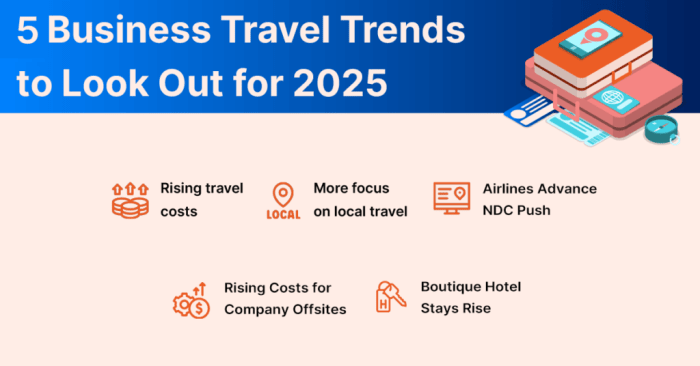Embark on a journey into the world of business travel planning in 2025 with our comprehensive guide. Explore the latest trends, technological advancements, and strategies that will shape the way companies approach travel management in the upcoming year.
Introduction to Business Travel Planning in 2025
Business travel planning in 2025 refers to the process of organizing and coordinating travel arrangements for employees of a company who need to travel for work purposes. This includes booking flights, accommodations, transportation, and arranging meetings or events at the destination.Efficient travel planning is crucial for businesses in 2025 as it directly impacts productivity, cost-effectiveness, and employee satisfaction.
With the right planning, companies can ensure that their employees reach their destinations on time, are well-rested, and have all the necessary resources to carry out their work effectively.Advancements in technology are revolutionizing the way business travel planning is conducted.
From AI-powered travel management platforms to virtual reality tools for site inspections, technology is streamlining the process, providing real-time updates, and enhancing the overall travel experience for employees. In 2025, businesses that leverage these technological innovations will have a competitive edge in managing their travel logistics efficiently.
Emerging Trends in Business Travel Planning
In 2025, several key trends are expected to impact business travel planning, shaping the way companies organize and execute their travel arrangements.
Sustainability and Eco-Friendly Practices
The role of sustainability and eco-friendly practices in modern business travel planning is becoming increasingly important. Companies are placing a greater emphasis on reducing their carbon footprint, opting for greener transportation options, and choosing eco-friendly accommodations to align with their corporate social responsibility goals.
This trend is not only driven by environmental concerns but also by the preferences of environmentally conscious travelers and the need to comply with stricter regulations regarding carbon emissions.
Virtual Reality and Augmented Reality
Virtual reality (VR) and augmented reality (AR) technologies are revolutionizing the way business travel is planned and executed. These immersive technologies allow travelers to explore destinations, hotels, conference venues, and even conduct virtual meetings without physically being there. By incorporating VR and AR into the planning process, companies can enhance the efficiency of their travel arrangements, save costs, and provide a more personalized experience for their employees.
Leveraging Technology for Streamlined Travel Planning

In today's fast-paced business world, leveraging technology is crucial for streamlining travel planning processes. From artificial intelligence to blockchain technology, advancements are revolutionizing the way businesses organize their travel itineraries.
Artificial Intelligence Optimization
Artificial intelligence plays a significant role in optimizing travel itineraries for businesses. By analyzing vast amounts of data, AI algorithms can suggest the most efficient routes, best times to travel, and even recommend accommodations based on individual preferences. This not only saves time but also ensures a smoother and more productive travel experience for employees.
Blockchain Technology for Secure Booking
Blockchain technology offers secure and efficient booking processes for business travelers. By creating a decentralized and tamper-proof system, blockchain ensures that sensitive information such as payment details and personal data remains protected. This eliminates the risk of fraud and enhances the overall security of travel bookings, giving businesses peace of mind when arranging trips for their employees.
Mobile Apps and Platforms Transformation
Mobile apps and platforms are transforming the way business travelers plan their trips. With the convenience of booking flights, hotels, and transportation options all in one place, employees can easily manage their itineraries on-the-go. Real-time updates, notifications, and personalized recommendations make the entire process more seamless and efficient, allowing travelers to focus on their work instead of worrying about logistics.
Enhancing Traveler Experience and Safety
Creating a positive and safe experience for business travelers is essential for successful business travel planning. By prioritizing both comfort and security, companies can ensure their employees are productive and well taken care of during their trips.
Strategies for Enhancing Traveler Experience
- Provide personalized travel itineraries tailored to the preferences of each traveler.
- Offer access to premium amenities such as airport lounges, chauffeur services, and exclusive accommodations.
- Implement digital tools for seamless communication, expense tracking, and itinerary management.
- Offer cultural immersion experiences to enhance the overall trip experience.
Importance of Prioritizing Traveler Safety and Security
- Establish clear safety protocols and emergency response plans for travelers in case of unforeseen events.
- Provide access to 24/7 support for travelers to address any safety concerns or emergencies during their trip.
- Ensure compliance with travel advisories and safety regulations in all destinations visited by business travelers.
Role of Data Analytics in Predicting and Mitigating Travel Risks
Data analytics plays a crucial role in identifying potential travel risks and taking proactive measures to mitigate them. By analyzing historical travel data, companies can predict potential disruptions, weather-related issues, or security threats, allowing them to make informed decisions to ensure the safety of their employees.
Sustainable Practices in Business Travel

Sustainable travel involves making environmentally friendly choices while traveling to minimize negative impacts on the environment, society, and economy. In the modern business landscape, sustainable practices are becoming increasingly important as organizations strive to reduce their carbon footprint and operate responsibly.
Reducing Carbon Footprint through Sustainable Travel Practices
Businesses can implement various strategies to reduce their carbon footprint through sustainable travel practices:
- Encouraging the use of public transportation, carpooling, or cycling for short-distance travel.
- Choosing eco-friendly accommodations that prioritize energy efficiency and waste reduction.
- Offsetting carbon emissions through partnerships with carbon offset programs.
- Implementing virtual meeting solutions to reduce the need for frequent business trips.
Innovative Solutions for Promoting Eco-Friendly Travel
Businesses can explore innovative solutions to promote eco-friendly travel among employees and organizations:
- Introducing incentives for employees who opt for sustainable travel options.
- Implementing a corporate travel policy that prioritizes eco-friendly transportation modes.
- Partnering with sustainable travel agencies or suppliers to support green initiatives.
- Organizing sustainability training programs to raise awareness and educate employees about the importance of sustainable travel.
Budgeting and Cost Optimization in Business Travel
Effective budgeting and cost optimization are crucial aspects of business travel planning. By implementing the right strategies, businesses can ensure that their travel expenses are well-managed and optimized for maximum cost-effectiveness.
Role of Predictive Analytics
Predictive analytics plays a key role in forecasting travel expenses and optimizing budgets. By analyzing historical data, trends, and patterns, businesses can make informed decisions about their travel expenditures. Predictive analytics can help identify cost-saving opportunities, anticipate price fluctuations, and allocate budgets more efficiently.
Negotiating Better Deals
Negotiating better deals with airlines, hotels, and other service providers is essential for cost-effective business travel. By leveraging the volume of their travel bookings, businesses can negotiate discounted rates, special packages, and other cost-saving benefits. Establishing strong partnerships with travel vendors can lead to long-term savings and improved travel experiences for employees.
Final Summary
As we conclude this guide to business travel planning in 2025, remember that staying ahead of the curve is key to successful corporate travel. By embracing innovation and sustainable practices, businesses can ensure seamless travel experiences for their employees while optimizing costs and prioritizing safety.
FAQ Overview
How can businesses adapt to the evolving landscape of business travel planning in 2025?
Businesses can stay relevant by embracing new technologies, focusing on sustainability, and prioritizing traveler safety in their planning strategies.
What role does data analytics play in enhancing business travel planning?
Data analytics can help predict travel risks, optimize budgets, and improve overall travel experiences by providing valuable insights and trends.
How can companies encourage eco-friendly travel among their employees?
Companies can promote eco-friendly practices by offering incentives, organizing awareness campaigns, and implementing policies that support sustainable travel choices.


![5 Best Field Service Management Software [2025]](https://ae.goodstats.id/wp-content/uploads/2025/09/38877ff56f11b8e71045b45896b02652-350x250.jpg)








